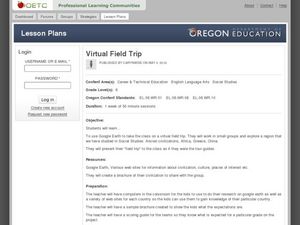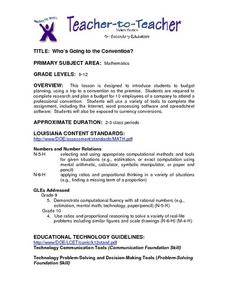Curated OER
What's Shaking? Three-Lesson Unit
Your young architects use the Internet to research tall structures or sky scrapers to help in the design of their scale drawings. This is lesson plan one of three in which learners design, build, and test model skyscrapers for seismic...
Curated OER
Geometric Figures and Applications
High schoolers study geometric figures. They use graph paper or Geometer's Sketchpad to construct and decorate geometric shapes, and also create a 3-D polygon using construction paper and a given template.
Curated OER
Virtual Field Trip
Are we there yet? Young trip planners learn about their state and plan a trip. They will select sites to see in three cities in their state, and record associated costs in a spreadsheet. While this was originally designed as a...
Curated OER
Who's Going to the Convention?
Students practice planning budgets as they create a budget for ten employees of a company to attend a professional convention. They use the Internet, and spreadsheet software to complete their assignment.
Curated OER
Angle Pairs
Students practice identifying right, vertical, and adjacent angles using a Smartboard. They then determine measurements of all of the angles when only one measurement is given.
Curated OER
Fraction Puzzle Problems
Fifth graders design a fraction word problem PowerPoint presentation. In small groups they complete a storyboard graphic organizer for their word problem, evaluate another group's word problem, and create a PowerPoint presentation of...
Curated OER
Planets an Introduction
Fourth graders investigate one planet, enter information into a database, and print the database sorting for each of the attributes.
Curated OER
Virtual Field Trip / Activity Research
Pupils visit a website to determine activities at three Michigan cities. They calculate the total cost of participating in the activities or visiting places such as zoos, planetariums, historic sites, and museums.
Curated OER
Shapes are Everywhere
Second graders gain an understanding of geometric shapes and spatial reasoning. They learn the attributes of solid shapes in everyday activities. Students compare geometric shapes to everday objects, finding things that serve a purpose...










